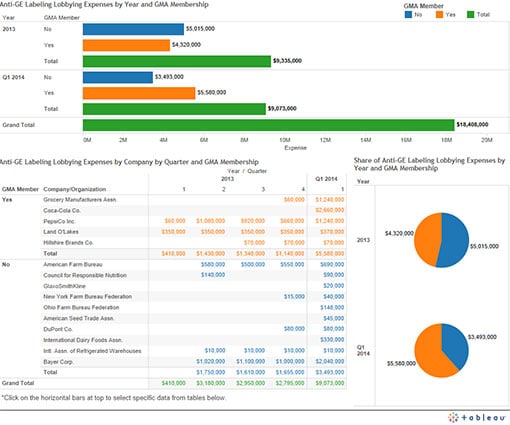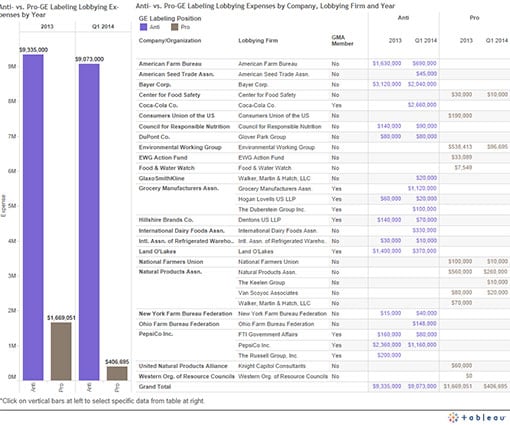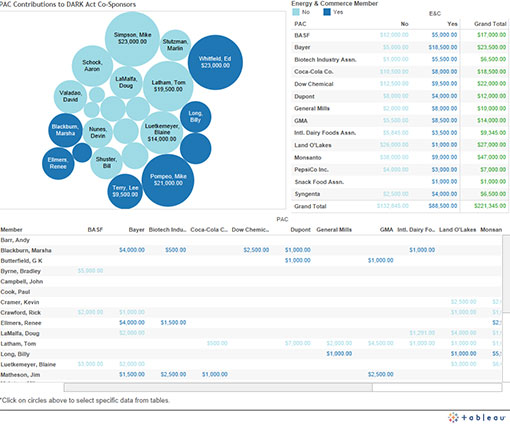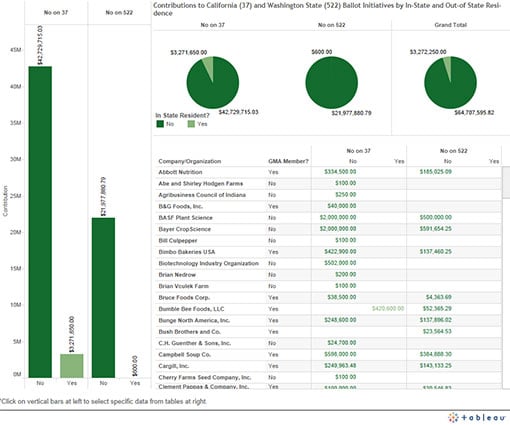The Anti-Label Lobby - Industry Lobbying boils over in bid to block Labels for Genetically Engineered Food
Industry lobbying to block labels for genetically engineered food boils overTuesday, July 29, 2014
Companies and organizations opposed to labeling foods that contain genetically engineered ingredients disclosed $9 million in lobbying expenditures that made reference to GE labeling in the first quarter of 2014 – nearly as much as they spent in all of 2013.
The burst of lobbying by food and biotechnology companies was partly designed to muster Congressional support for legislation that would block states from requiring GE labeling on food packages. That bill, dubbed the Deny Americans the Right to Know (DARK) Act by advocates of GE labeling, was introduced on April 9 by Rep. Mike Pompeo (R-Kan.).
In May, Vermont became the first state to enact legislation to require GE labeling, although industry has filed suit in an effort to block it. Connecticut and Maine have passed GE labeling laws that would go into effect if other northeastern states pass similar legislation.
Oregon and Colorado voters will consider GE labeling ballot initiatives this fall, and labeling bills have been introduced in 30 other states in 2013 and 2014.
Food and biotechnology companies and organizations disclosed $9.3 million in lobbying expenditures in 2013 that made reference to GE labeling and $9 million in the first quarter of 2014 alone. The forms cite lobbying on GE labeling as well as other policy issues.
In particular, the Grocery Manufacturers Association disclosed $1.2 million in lobbying expenditures that made reference to GE labeling in the first quarter of 2014. The Association’s member organizations separately disclosed another $4.3 million in lobbying expenditures that made reference to GE labeling in the first quarter, including $3.9 million by beverage giants Coca-Cola and Pepsi.

Several companies that produce genetically engineered seeds and herbicides – including Monsanto, Syngenta and Dow AgroSciences – did not report lobbying specifically on either piece of legislation on their 2013 disclosure forms or in the first quarter of 2014. Instead, their reports cited general advocacy on “biotechnology and biotech product issues,” “biotech innovation and regulation” and “biotechnology acceptance.” This language could easily include GE labeling, but that wouldn’t be obvious to the general public.
Lobbying expenditures for the second quarter of 2014 were due Monday (July 21), and the new data will be available by the end of July.

Pompeo was the second-largest recipient of these campaign contributions, and Monsanto’s own PAC was the most generous PAC contributor.


Instead, the DARK Act would codify existing FDA rules that permit voluntary GE and non-GE labels. To date, no food manufacturer has voluntarily disclosed the presence of GE ingredients in its products.
Americans overwhelmingly support the right to know whether there are genetically engineered ingredients in their food, and recent polls in Oregon and Colorado found that more than three-quarters of voters in those states feel the same way.
No comments:
Post a Comment